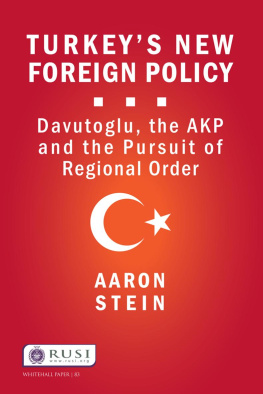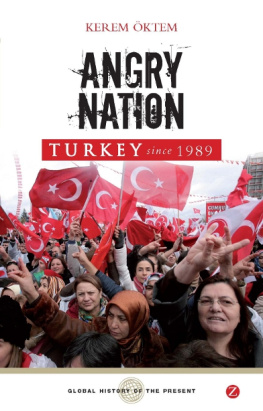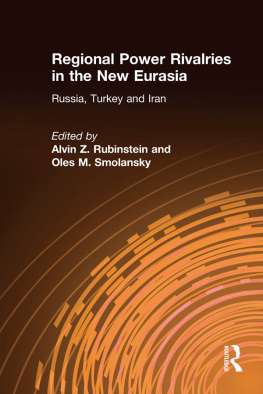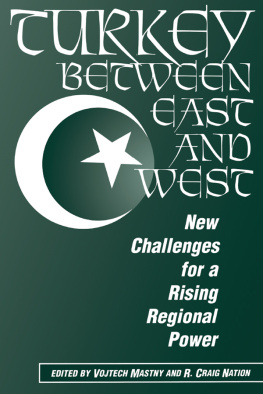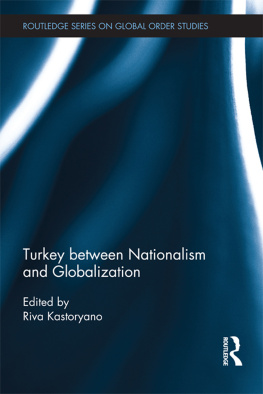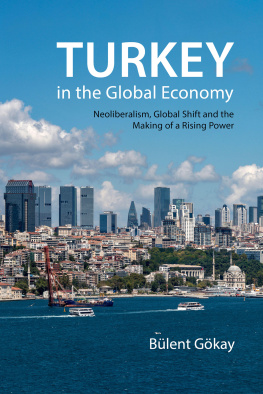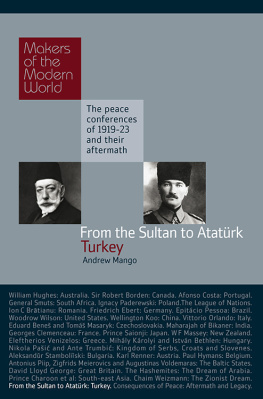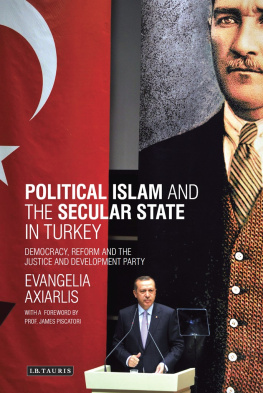
Ali Bilgi is Assistant Professor in the Department of International Relations, Bilkent University, Ankara. He holds a PhD from Aberystwyth University in the UK. His research interests include feminist and gender approaches to world politics, critical approaches to security, new political activism, Turkey's foreign policy, and the European Union's external relations. He is the author of Rethinking Security in the Age of Migration: Trust and Emancipation in Europe (2013). His articles have appeared in Review of International Studies, Security Dialogue, International Relations, Mediterranean Politics, Journal of Southeast EuropeanandBlack Sea Studies, and International Migration.
This is a superbly written and thoroughly researched original study that contributes in highly significant ways to three literatures not normally brought together: foreign policy studies, gender/feminist research, and post-colonial perspectives through which the East/West binary is reimagined.
Terrell Carver, Professor of Political Theory, University of Bristol
Ali Bilgi shows us here why asking smart gender-analytical questions is so crucial if IR practitioners hope to be useful and reliable. Turkey, Power and the West reveals the ways in which masculinities are wielded by the US, the EU and current Turkish officials of the Erdoan government. In contesting past allegedly feminising humiliations with contemporary assertions of masculinised militarism, Turkish elites have a lot of company.
Cynthia Enloe, author of the newly updated Bananas, Beaches and Bases
Breaks new ground by bringing the insights of feminist and post-colonial theory to bear on Turkish foreign policy, thereby making a much-needed critical intervention into the debates on Turkey's relations with the world a most welcome addition to the literature on Turkish foreign policy.
Asli Calkivik, Assistant Professor of Political Science, Istanbul Technical University
TURKEY,
POWER AND
THE WEST
Gendered International Relations and Foreign Policy
A LI B ILGI
Published in 2016 by
I.B.Tauris & Co. Ltd
London New York
www.ibtauris.com
Copyright 2016 Ali Bilgi
The right of Ali Bilgi to be identified as the author of this work has been asserted by the author in accordance with the Copyright, Designs and Patents Act 1988.
All rights reserved. Except for brief quotations in a review, this book, or any part thereof, may not be reproduced, stored in or introduced into a retrieval system, or transmitted, in any form or by any means, electronic, mechanical, photocopying, recording or otherwise, without the prior written permission of the publisher.
References to websites were correct at the time of writing.
Library of Modern Turkey 19
ISBN: 978 1 78453 347 2
eISBN: 978 1 78672 084 9
ePDF: 978 1 78673 084 8
A full CIP record for this book is available from the British Library
A full CIP record is available from the Library of Congress
Library of Congress Catalog Card Number: available
ACKNOWLEDGEMENTS
I was a teenager in the 1990s, with a middle-class, secular, nationalist, and Atatrkist background. And I was angry with a Europe which constantly criticised my country due to democracy and human rights problems. Who were they to do this? They were those who had tried to occupy the country 70 years before. Now they were trying to do the same again. But then, why was I so happy when Turkey entered the Customs Union (I did not know what the Customs Union was, but it was Europe for me)? Why was I so proud of myself when the newspapers came out with the headlines European Turkey in 1995? Why did I, as a teenager, get angry and frustrated when the Western media was showing photos of women wearing headscarves from Turkey? In my thinking, they were not doing justice to my country, which was European for me. Look at how I live, how I dress, and how I think? Headscarf women could not represent this Western country, I thought; they belonged to the past, to a geography and people against which I positioned myself.
I wrote this book because I needed to find out what made a teenager from the Global South feel this way, and I received much help in the pursuit of answers.
Although academic works carry their authors' names, they are in fact products of collective endeavours. There are so many scholars to whom I owe my gratitude. Exchanges with Terrell Carver, Cynthia Enloe, Spike Peterson, and Annick Wibben encouraged me to continue working on the project. Ken Booth gave vital feedback on the article upon which the book is based. Terrell Carver, Asli Falay Calkivik, and Berk Esen shared their comments on the whole version. With his friendship and intellectualism, Clemens Hoffmann has been a source of, and a push for, intellectual and academic openings in my thinking. I owe all of them thanks, while all mistakes and omissions are solely mine.
Lastly, I would like to thank SAGE Publishing and the editors of International Relations for kindly allowing me to reproduce the sections of my article, We are not barbarians: Gender Politics and Turkey's Quest for the West, International Relations, xxix/2 (2015), pp. 198218.
INTRODUCTION
GENDERED POWER HIERARCHIES BETWEEN TURKEY AND THE WEST(S): A CASE FOR FEMINIST POST-COLONIAL ANALYSIS
In 1911, Enver Pasha, one of the leaders of the Committee of Union and Progress that ruled the Ottoman Empire from 1913 to 1918, wrote to his friend from Tripoli, the last territory of the Empire in North Africa under Italian occupation: I hope, my dear friend, that we will show civilised Europe that we are not barbarians who are not entitled to rights, and that we deserve respect.
Ambivalence was also detectable in his words: True, I hate my European enemies, but I also admire them because they showed me that I was right during our conversations with Hans, when I said only interests matter in the game of nations, there is no role for emotions. In two different historical-political contexts, two foreign policy makers of the Ottoman Empire/Turkey developed similar narratives. Both Enver Pasha and Ecevit were keen to convince Europe/the West/international society (henceforth, the West) that their country should not be treated by the West with disrespect and contempt, as Turkey is like the West and one of them, not barbarians.
This book is the analysis of Turkey's relations with the West from a feminist post-colonial perspective. It aims to explore the processes through which power hierarchies between the West and Turkey have been historically reproduced and how these power hierarchies have come to be perceived as sources of insecurity for Turkey's policy makers. The central research question is: how does gender work in normalising, legitimising and reproducing power hierarchies between the West(s) and Turkey by generating insecurities for the latter?
Turkey's foreign policy vis--vis the West has been studied from competing theoretical and historical perspectives. However, these studies, which include constructivist and critical accounts focusing on identity construction processes between Turkey and the West, have not factored gender as an analytical category. Consequently, they overlook the ways in which gender and gendering has been a constitutive trope in these processes. To the contrary, the present feminist post-colonial analysis lays out the gender regime of Turkey's political and economic relations with the West(s). More specifically, it analyses gendering feminisation and hypermasculinisation as a source of insecurity for the non-West with specific reference to Turkey's relations with the West. Moreover, in line with the feminist objective of unfolding the interplay between the domestic and international, the discussion aims to provide a fresh look at statesociety relations in Turkey by positioning this ostensibly domestic issue within the context of TurkeyWest relations. This examination will be performed through the theoretical insight offered by writers of post-colonial and feminist literature, literature on masculinities, and feminist critiques of Orientalism. The analysis will be built upon five assumptions:




